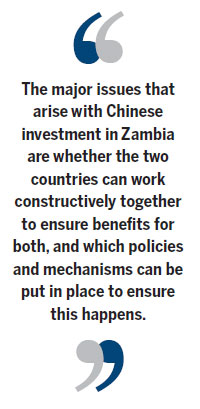China and Zambia need to ensure their relationship is based on mutual respect
Relations between China and Zambia are growing in leaps and bounds, just as the friendship between China and Africa is flourishing. China's growing involvement in the continent has sparked reactions in many parts of the world that can only be described as perplexing.
Relations between Zambia and China have their origins in southern African liberation movements in Zambia, Tanzania, Zimbabwe and Mozambique, among others. The China-Zambia relationship was given a huge fillip with construction of the Tanzania-Zambia Railway (Tazara) with Chinese financial and technical assistance in the early 1970s, when the two countries failed to obtain Western support for the huge project.
The West often stereotypes Africa as a global backwater plagued by poverty, disease, ethnicity, conflict and corruption, the result being an approach based on paternalism and cultural superiority.
Europe has long regarded Africa as a burden, whereas China has increasingly regarded it as an opportunity. The central issue is whether this interest in Africa benefits the continent. The Chinese government pushes for ever greater investment in Zambia and the rest of Africa is also highly significant.
Zambia, with a population of 14.1 million, became an independent republic within the Commonwealth of Nations in 1964. It is rich in minerals, particularly copper, zinc, cobalt, lead, uranium and manganese. Copper mining dominates the economy. In fact, Zambia is a leading copper producer, and the mining industry is the most important sector of the economy.
In the 1980s a steep decline in the price of copper badly hurt the economy, and in June 1990 that turned to violence in the form of riots over food.
Zambia is one of the poorest countries, ranking 163 in the United Nations Development Programme human development index last year.

Fortunately, copper output, which had fallen until the 1990s, has increased steadily over the past 10 years. The economy is said to have grown 7.3 percent last year. The mining sector grew 10.6 percent in 2012 and 2013. Construction has been pivotal to Zambia's growth in recent years, accounting for 21.1 percent of the economy. Indeed, Zambia can now be said to be on the rise.
Since China and Zambia established diplomatic relations 50 years ago, hundreds of Chinese companies have set up businesses in Zambia, ranging from mining, textiles, construction, banking and agriculture, to medical clinics and restaurants. Some of these companies, such as Non-Ferrous Africa Mining Plc and Zambia China Mulungushi Textile company, are large and play an important role in the economy.
In recent years Chinese investment in Zambia has grown significantly. Last year it stood at $2.6 billion, creating about 50,000 jobs.
China and Zambia have also enjoyed a trade boom in recent years. China is the second-largest destination of exports for Zambia. Their trade volume reached $3.8 billion last year, of which $3.1 billion worth of exports were from Zambia to China. Bilateral trade in the early 1990s was worth just $20 million.
The China-Zambia Economic and Trade Cooperation Zone, managed by China Nonferrous Metal Mining Group, is the first of its kind set up in Africa by China. In the seven years since it opened, some 30 businesses have set up shop in this park, creating more than 7,000 jobs.
China has also built stadiums in Ndola and Lusaka.
More and more Chinese are coming to Zambia to start businesses. In April last year, Michael Sata, president of Zambia, paid a state visit to China and reached a series of important agreements with Chinese President Xi Jinping.
Chinese investment in Zambia is a welcome development. For one thing, China's strong economic growth and its hunger for raw materials such as copper, iron ore and aluminum have provided the foundation for sharp rises in commodity prices over the past 10 years. This has resulted in increased revenue for Zambia and, as a result, the country's mining sector has grown an average of 9 percent a year in recent years.
The major issues that arise with Chinese investment in Zambia are whether the two countries can work constructively together to ensure benefits for both, and which policies and mechanisms can be put in place to ensure this happens. Ultimately, the critical responsibility for both China and Zambia is to ensure that their relationship is based on mutual respect, so that it brings about joint prosperity, and is free of the overtones of exploitation and paternalism that critics worldwide say have governed much of the West's post-colonial relationship with Africa.
The author is a professor at Addis Ababa University, Ethiopia.
